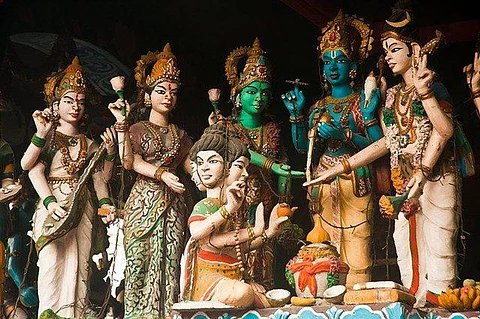
- Home
- न्यूजग्राम
- NewsGram USA
- India
- World
- Politics
- Entertainment
- Culture
- Lifestyle
- Economy
- Sports
- Sp. Coverage
- Misc.
- NewsGram Exclusive
- Jobs / Internships

BY- JAYA CHOUDHARY
In Indonesia, Hinduism is the third most popular religion. Hinduism is practiced by around 1.7 percent of the Indonesian population or around four million people out of a total population of over 250 million. The bulk of Indonesia's Hindu population now resides on the island of Bali, which is known for its Hindu culture and natural scenery. In contrast to other regions of Indonesia, Islamic forces were not powerful enough to break through the high Balinese cultural barriers, resulting in a majority Hindu population on the island till the current day.
Arrival of Hinduism
Before Muslim traders introduced Islam to Indonesia in the 12th and 13th centuries, the country's dominant religion was Hinduism. Hinduism arrived in Indonesia in the first century. By the fourth century, Hindu kingdoms had established themselves on the island of Java. Hinduism eventually expanded across the remainder of Indonesia, peaking in the 14th century.
By the end of the 16th century, most of Indonesia had become Muslim, but Bali remained Hindu. The Indonesian government declared Hinduism to be an official religion in 1959. As a result, Indonesian Hindus practice Dharma Hinduism. It was a prominent reform movement in Bali that advocated for Hindu rights. This reform aided in the resurgence of Hinduism in Indonesia.
Hinduism is practiced by around 1.7 percent of the Indonesian population or around four million people out of a total population of over 250 million. Pixabay
Balinese Hinduism
Bali, one of Indonesia's most popular tourist destinations, is known not just for its stunning beaches and landscapes, but also for its distinctive cultural legacy: a Balinese Hindu culture based mostly on art and ritual. This religion differs from Hinduism as it is practiced in India because Hinduism experienced dramatic modifications on the island of Java before arriving in Bali. The merger with Buddhism is a significant element of this shift. This element may still be seen today since some Buddhist religious works play a significant part in Balinese Hinduism, and the island has a priesthood that includes both Hindus and Buddhists.
Reincarnation and rebirth are not emphasized in Balinese Hinduism. Instead, it concentrates on ancestral and local spirits. There are courtyards and altars in the temples. Outside, there are walls with exquisite gates that lead into the complexes. Ritualized states of self-control are another essential component of Balinese Hinduism. The mythological characters Rangda the witch and Barong the predator are commonly included in dance dramas, one of which involves a struggle between them.
Reincarnation and rebirth are not emphasized in Balinese Hinduism. Pixabay
Coexistence and inequality
Indonesia has been known around the world as a country that promotes tolerance. In August 2014, Indonesia hosted the United Nations Alliance of Civilizations (UNAOC) in Nusa Dua, Bali. Indonesia is one of the nations that symbolizes peaceful coexistence and life of brotherhood, and it has long served as a model and symbol for Islamic countries.
However, religious freedom violations in Indonesia surged significantly in the first six months of 2018. According to a study released on August 20 by the Setara Institute for Democracy and Peace, there were 109 incidents of discrimination, intolerance, violence, and hate speech across 20 provinces, up from 80 incidents in the first half of 2017. The province of Jakarta had the most instances, with 23, followed by West Java and East Java, which had 19 and 15 instances, respectively.
Discrimination by the state is prevalent for members of religions making it difficult to register children for school, get wedding documents, and gain jobs. As a result, asking to be reclassified as a Hindu is frequently triggered by the intolerance faced by indigenous faiths' adherents, rather than by a true embrace of Hindu teachings.
